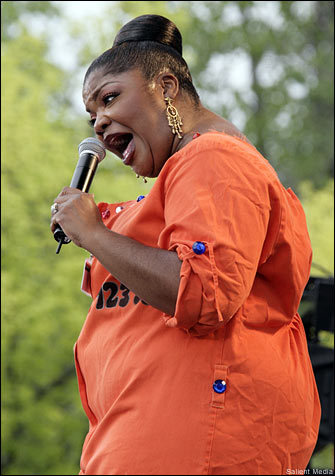by Courtney Hilden

Mo'Nique's I Could Have Been Your Cellmate is two smaller films in one: a stand-up performance and a documentary on a women's correctional facility in Ohio.
As uninformed as most Americans probably are about correctional facilities, they’re probably even less informed about those facilities for women. At this particularly facility, “the Farm,” over 80 percent of the prisoners have suffered from some kind of abuse. A large majority of women prisoners are mothers.
The most powerful part of the documentary are her interviews with the women. The women all look incredibly normal, not like, say the women in Lady Gaga’s “Telephone” music video. One of the prisoners Mo’Nique talks to looks like an-about-to-retire Grandma. A fair amount of the women have very positive attitudes about their incarceration, saying that they have jobs or are taking classes in an effort to improve themselves.
Mo’Nique herself obviously believe in rehabilitation for prisoners, which is part of the reason she filmed this documentary and comedy show. She herself explains that they deserve “A Little Bit of feel-good.” She even admires them, because they’re still standing. Even if you don't like Mo’Nique, but seeing her here as a caring, respectful, kind observer of prison life will make you respect her in turn.

I also ended up learning more about her. For example, I had no idea that Mo’Nique was a mother or that she had been abused by her first husband. Upon further research, I discovered that her own brother abused her and was later sentenced to jail. This detail gives the documentary an extra oomp, since, as she keeps saying in her standup performance, “could have been your cellmate.” And maybe that’s the most interesting thing about Mo’Nique: she sees the prisoners and her as more similar than different. Her comedy is about uniting people in humor, not isolating them into groups.
She discusses a lot about sexuality. There were little hints of it in the beginning, mentioning the race problems within the prison and the belief that female prisoners are lesbians. She riffs entirely on the idea of anal sex, saying that she respects and pities gay men. She then criticizes those who use the Bible to defend or reject homosexuality, saying that it’s about what they think, not what the Bible says. “I don’t feel like you have to turn to the Bible…for all of your righteousness,” she explains.
The only thing odd about the film was it's structure. In the beginning, Monique interviews several prisoners. Then they cut to her standup performance at the prison. Then, at the end of the film, they go back to interviews and shots of her seeing other parts of the facility. Why it's structured this way is never clear, and it feels incoherent.
Mo’Nique is always fun to watch, especially where she wears an orange-jumpsuit designed dress. What makes this comedy special different is that, as an audience member, you can tell that Mo’Nique was working to make a cathartic experience for these female prisoners. It’s hard not to admire that desire.
No comments:
Post a Comment